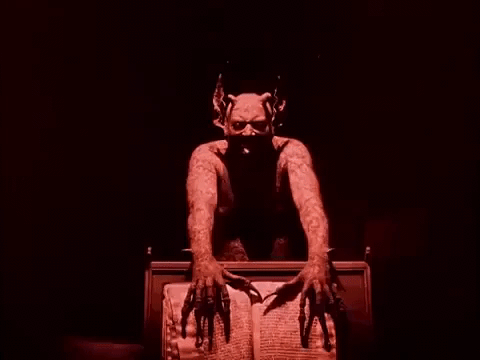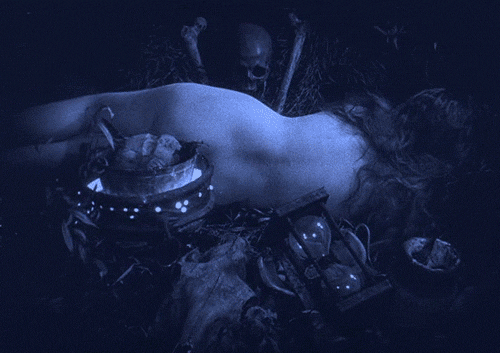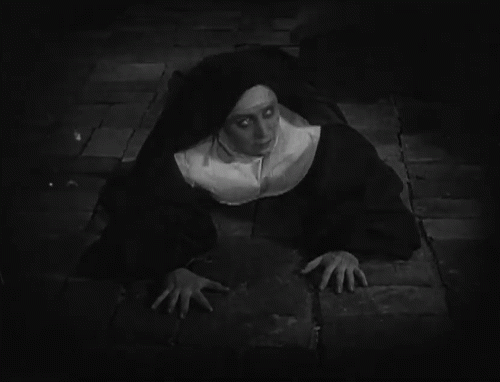Every once in a while, a genuinely great horror movie—one that would rightfully be considered a classic, had it gotten more exposure and love at the box office—makes an appearance. It comes, no one notices, and it goes. But movies like this are important. They need to be treasured and remembered. If intelligent, original horror is supported, then that's what we'll begin to receive, in droves. We need to make these movies a part of the legendary genre we hold so dear. Because these are the unsung horrors. These are the movies that should have been successful, but were instead ignored. They should be rightfully praised for the freshness and intelligence and craft that they have contributed to our genre.
So, better late than never, we’re going to celebrate them now… one at a time.
 Dir. Roman Polanski
1999
Artisan Entertainment
United States
Dir. Roman Polanski
1999
Artisan Entertainment
United States
"I'm entering uncharted territory. Taking the road that leads to equality, with God. You can't come with me. I must travel alone. But you may look on, and marvel. ... There have been men who have been burned alive or disemboweled for just a glimpse of what you are about to witness."
Personal feelings about Roman Polanski aside, his early dabbling in the horror genre is still cited today as inspiration for multiple filmmakers. It seems four out of five horror directors cite Rosemary's Baby as an influence either on any one of their particular films, or their career in general. The more studious may cite Repulsion or The Tenant, and the real nerd will name-drop Knife in the Water, which while not all-out horror still maintains quite a bit of tension and discomfort. It was for this reason that his 1999 return to horror with The Ninth Gate at first elated those with an awe for Polanski, though audiences didn't really turn out in droves. This one seemed in the bag, really – Depp was on a hot streak and Polanski was returning to the genre. But for whatever reason, it never took off, and that is a damn shame.
Johnny Depp plays Dean Corso (the surname being Italian for "run"), a sort of collector, investor, investigator, authenticator, and tracker of extremely rare books. (No idea if this is an actual, real-life profession, but, I'm certainly willing to go with it, as it sounds way better than my job.) His chosen profession gets him into all sorts of "unscrupulous" conflicts, but he always seems to come out on top, with a non-grin, and a lot of green in his pocket for his troubles.
After swindling the children of an invalid man with a very valuable book collection, Corso meets with Boris Balkan (Frank Langella), a client with another very unique job. You see, Balkan has spent "a lifetime" amassing a collection of books devoted to the occult. He boasts there is no larger collection in the world. Among these books is The Nine Gates of the Kingdom of Shadows, written by Aristide Torchia in 1666(!) in Venice. Though three copies exist, only one is authentic. Allegedly The Nine Gates was based on the Delomelanicon, a previous tome written by Satan himself. The legend goes that the sole genuine copy of The Nine Gates of the Kingdom of Shadows has the power to raise Satan up from the underworld. Balkan pledges to pay Corso nearly as much as he wants should he travel to Europe and examine the other two copies to determine which of them is genuine. His journey finds him embroiled in sex, murder, and even Hell itself. (All the best European holidays do.) And whether or not he finds what he is looking for, there's no coming back.
The Ninth Gate's story is mapped out using perhaps my favorite underutilized sub-genre of horror, which would be noir – a man chasing a mystery that leads him into unfamiliar and diabolical territory. Sure, you could argue that every horror film has a mystery at its core, but those that follow the very established tropes – the detective in over his head, the femme fatale, the client firmly entrenched in the horror that awaits his hired help – deserve special mention. Other films of equal power and unfortunately equal lack of appreciation previously befell In the Mouth of Madness and Angelheart, both about private detectives who find themselves in very unfortunate circumstances.
Depp signed onto The Ninth Gate back during the phase of his career when he hadn't yet lost his soul to the Mouse House and was willing to take on riskier roles. And during the late '90s, having come off both Fear & Loathing in Las Vegas and Donnie Brasco, he had nothing really to lose and everything to gain from working with a living legend such as Polanski. And if you're going to hire someone to play a complete douchebag who still manages to earn sympathy from your audience, there's no one better than Depp.
Do you believe in the supernatural, Mr. Corso?
I believe in my percentage, Mr. Balkan.
Regardless of how lazy and uninspired his role choices have been over the last decade, there's no denying Depp was great, and could still be under the right circumstances. Corso will literally yawn as you speak to him, or clean his glasses without bothering to hide his complete disinterest in small talk. His mustache/goatee and glasses cause him to skew a bit older (likely the intention, as it complements the salt-and-pepper hair), and it helps to explain his extremely cynical and jaded view of...well...everything. Money leads his life, which he lives in isolation – no wife/girlfriend, and certainly no friends, which Balkan is quick to notice, point out, and appreciate. His only "friend" – if you can call him that – is Bernie (James Russo), co-owner of Corso's rare book store, though the importance of this friendship is certainly determined later once Bernie meets an untimely end.
Langella, who has done consistently great work in every genre (once having played Dracula), does a very fine job of playing a psychopath masquerading as a boring aristocrat. It's easy to ham it up in some if his lesser projects, like Masters of the Universe, but it's a lot more rewarding, I'm sure, to equally lose oneself entirely in a performance while under the tutelage of someone like Polanski. Though a large portion of his performance is relegated to a voice on the phone, Langella is still capable of presenting a dominating presence. Emmanuelle Seigner as "The Girl," and your requisite femme fatale (one of two), knows her role: be sexy and be mysterious. She plays it well. "I like books," she tells Corso, though her choice of reading materials (How to Make Friends and Influence People) certainly isn't along the same lines as the titles Corso is used to tracking down. And this strange choice of reading material may or may not hang, ironically, in the back of your mind as The Girl's true identity is eventually revealed. As for the other femme fatale: Lena Olin as Liana Telfer out-sexes sex itself. She is gorgeous here, mid-forties not withstanding, and she's ably both sultry and dangerous. (Or maybe I'm a sucker for garters.)
Composer Wojciech Kilar, one of my personal favorites (and responsible for the wonderfully operatic and over-the-top score for Frances Ford Coppola's take on Dracula) turns in some pretty wonderful work here. His themes alternate from ominous and pulse-pounding to nearly whimsical and clumsy. His theme for Corso alludes that the man isn't the most intelligent, as his musical accompaniment suggests a sort of doddering man who is haphazardly wandering from one clue to the next. This doesn't exactly match up with the actual on-screen version of Corso, who I would argue is actually more unprepared than outright stupid, but then again, that's the beauty of interpretation.
As for the film's direction, well, I'd be incorrect, simply put, if I were to say Polanski was at the top of his game here. But those people who call his direction over The Ninth Gate lacking are equally misguided. He was never a director who did or tried interesting things with the camera (for the most part, anyway, as there's a fun in-camera gag where Corso is knocked out), as he was always more interested in drama – in spending time with his characters and having the audience join them on their journey. In that regard, The Ninth Gate fits well into his filmography. Corso runs afoul of many different characters - both benevolent and malevolent – but his goal is never deterred. It's his journey we're undertaking here, and we get to experience his sexual misadventures, his close calls, and even his utter befuddlement in the events that surround him. In the earlier exchange where he avoids labeling himself either as a believer or refuter of the supernatural, it seems to me that Corso might just be a believer after all. As he becomes embroiled in the events, he certainly comes off as disturbed and fearful, but never altogether surprised. You could argue that Polanski's interpretation of the Corso character is of a man who is eager not to authenticate The Nine Gates, but instead to determine the actual existence of the devil. After all, what is it they say: If God exists, then surely so should the Devil? If Corso is out to determine the existence of a god, he can surely do that by locating one lousy fallen angel. (I suppose you could also argue that The Ninth Gate is about fate, but that's kind of fucking boring, seeing as how you could argue every film is about fate.)
Not having seen every Polanski film, I still think I'm safe in saying he generally keeps his humor separate from his purposely darker stories. But in
The Ninth Gate, he seems absolutely willing to have some fun, as I suppose the rather silly nature of the story he is telling needs to be lightened up occasionally. He is never without respect for this unorthodox mystery, but at the same time he likes to pop up from time to time and state, "Don't take this too seriously." Despite this, Polanski isn't exactly throwing pies and asking who's on first. Yes, there are some fun characters who show up to provide whimsy, but Polanski's idea of humor is a character confined to a wheelchair, recently dead, motoring unguided through a set of double doors and directly into fire, or Liana, post-coitus, telling Corso, "Don't fuck with me," and Corso responding, "I thought I just did?" Some of
The Ninth Gate's humor has darkness and edge. At its core it's mean-spirited and even a little angry, and it fits right in.
Partly based on the novel
El Club Dumas by Arturo Pérez-Reverte, and as previously mentioned, Polanski has fun with his version of Dean Corso, who slowly becomes more and more obsessed with his assignment, though he's not entirely prepared for where it will bring him. A good detective Corso may be, he's still entirely in over his head.
No matter how many plays or Dickens tales he adapts for the screen, to horror fans (and I mean this in every respectful way possible) Roman Polanski is always going to be the man who directed Rosemary's Baby – considered to be one of the greatest horror films of all time. And because of this, every announcement of a new Polanski film will have fans scanning the log line hoping to see his return to the genre. It's not impossible, nor even unlikely, that he'll return to the genre that put him on the map.




























